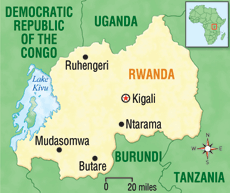Many problems here seem to stem not only from the many factors we were taught in grad school (poverty, lack of female education, etc.) but also the roles of men and women in society. In our area, the majority of people make what small money they have from farming, and women are expected to perform the brunt of the work. In addition to cooking, cleaning and raising the children, they are expected to do the planting, cultivating and harvesting as well. Men, if they work, prefer to do things like carpentry. More typically, they like to hang out and drink alcohol together (either beer brewed by companies such as Primus and Mutzig or the local banana beer.) While I was working in ARV services recently, one man who came in had a CD4 count of 75 because would get drunk and forget to take his ARVs. Polygamy, though illegal, is still a huge problem, especially when, as in one case, the man had HIV but refused to bring in any of his wives for testing. It is not uncommon for a man to have one wife in one village and another in another village. There are also many discordant relationships (the man is HIV+ but the wife is not or vice versa.) Though it is easier for women to contract HIV, I must admit there are many more discordant relationships in which the wife is positive and the man negative than I expected to see.
The other major concern insofar as HIV and AIDs are concerned in our region is PMTCT (or the lack thereof.) While the PMTCT (Prevention of Mother to Child Transmission) services are available and work when utilized, an alarming number of women refuse to have babies tested even if they themselves are on ART. The health clinic is in desperate need of a better catchment system for identifying at risk children, because even if the children come for immunizations and malnourishment testing, there is no means for identifying those exposed and testing them. Improving the number of HIV+ children on medicine therefore requires a two-part system: improved identification and catchment for testing of at risk children and education for their mothers to emphasize the importance of this testing.
Further complicating the issue is the risk of vaccinating HIV+ infants. A new study in South Africa (WHO, 2009) has found that giving HIV positive or potentially positive children the vaccine could make them more susceptible to a deadly form of TB. This is only the latest addition to the list of vaccines that are not recommended for HIV positive children, including Pneumococcal, MMR, Varciella, and Influenza. Identification of such HIV positive is even more critical now than ever in Rwanda because the country has recently begun an initiative making the Pneumococcal vaccine available for the first time (my own health center just started giving the vaccine out yesterday.)
Subscribe to:
Post Comments (Atom)


Long time, No blog post. let us know about your work. We also expats in Rwanda.. loving your blog
ReplyDeleteThis comment has been removed by a blog administrator.
ReplyDelete